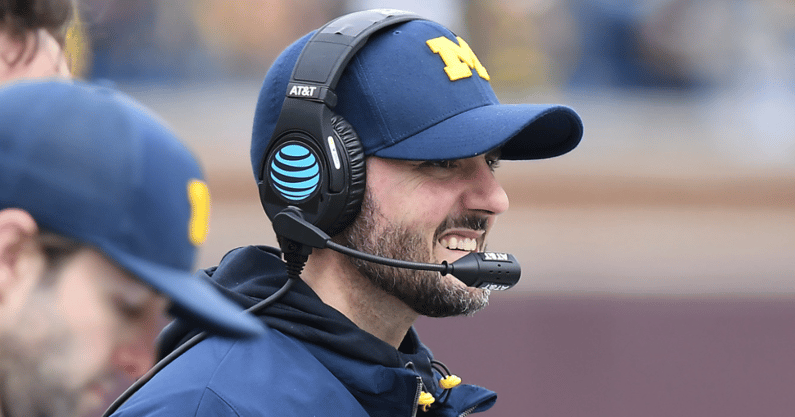Is time of possession an overrated stat? Not to Jesse Minter

Earlier this year, Big Ten coaches were asked on a TV show what the most overrated statistic was when it came to winning. Several, if not most, singled out offensive time of possession as the most meaningless when it came to winning.
RELATED
• Michigan football playoff possibilities — how it should be, how it is
• Tuesday Thoughts: Michigan’s ‘elite’ defense, Jim Harbaugh on recruiting, more
Michigan defensive coordinator Jesse Minter doesn’t agree, and it’s easy to see why. The Broyles Award finalist (nation’s top assistant coach) has put together an outstanding defense with the help of co-coordinator Steve Clinkscale, but there are many times he’s had plenty of time to put together his plan on the sidelines.
That’s because the Michigan offense has been so dominant on the ground, his group often has time for a cup of coffee and a newspaper before having to take the field again. U-M is averaging better than 35 minutes of possession per game, good for third nationally, in keeping the defense off the field.
“Our ability to run the football, sustain drives, not turn the ball over … that’s a D-coordinator’s dream to be with this style of offense,” Minter said.
It helps, too, to have a defense that can stop the run and get off the field quickly. That’s been the case most of the year. Against Nebraska, there were a couple three-and-outs and the offense took up a lot of time on its first drive in the first quarter.
In the third stanza, Nebraska managed 19 yards on 8 plays while the Michigan offense held the ball for nearly 11 minutes. It was similar a few weeks earlier against Michigan State.
“You get one quick three-and-out, and that might be the only drive you play that quarter,” Minter said. “It’s a total group, team, culture effort to play well in the second half … and when you play complementary football — which we’ve done a tremendous job of — our offense can go on a long drive.
“It’s a huge mentality for us to go out and get a quick three-and-out and put pressure back on the other team’s defense that might have just been on a six- or seven-minute drive … to go right back out there. To not have as much time to adjust, not have as much time to make corrections, and get them right back on the field … that’s definitely something we talk about.”
Minter has his defense excelling in another area, too
That they’ve done well. They’ve been dominant, in fact, in outscoring teams 117-3 in the last five games, and on both sides of the ball.
But they’ve also done a great job when teams try to catch them off guard with tempo. Michigan State did it last year, one of the only reasons the Spartans pulled out a win. Indiana tried, as it usually does, but Minter had his guys prepared.
“It was a process for us,” Minter told Jon Jansen on the Inside Michigan radio podcast Monday. “There were a couple opportunities early in the year that we learned from where we may have had a chance … times where an offense coordinator may decide with 10 seconds on the play clock to go from 11 to 12 personnel, and if you decide to sub, you can really put them in a tough bind. We’ve had a couple of those that have worked out for us.
Top 10
- 1
Commit analysis
What flipping recruit from Wisconsin means
- 2Hot
Redshirt tracker
Nine Wolverines have burned redshirt
- 3
Coaches on recruiting trail
Where U-M is headed
- 4New
Podcast
Bye week storylines, hoops
- 5
True or false?
Michigan football narratives
Get the Daily On3 Newsletter in your inbox every morning
By clicking "Subscribe to Newsletter", I agree to On3's Privacy Notice, Terms, and use of my personal information described therein.
“But ultimately, it’s about No. 1, us matching personnel; No. 2, trying to slow down the game when it allows and just take advantage of the rules. There are times where we can go 10 straight plays without subbing. So when we do get that opportunity to sub, we need to take advantage.”
When the offense does sub, Minter noted — whether it’s running back for running back or they go from one personnel to the other — the referee will stand over the ball for roughly two and a half to three seconds.
“You have to make a quick decision of whether you want to sub on defense, to either match their personnel … so we might go from base to nickel, or we might be in nickel, and just want to do a one for one, or a two for two, or three for three, or even like the whole front four,” Minter continued. “So, it’s a split second timing at times. Sometimes when you play a tempo team, you plan for that.
“So it’s like — ‘hey … they don’t sub a lot, but when they do you have an opportunity to get a fresh guy in … to actually slow down the pace of their play, and yeah, for your guys that are out there to kind of catch their breath.”
So far, it’s all worked incredibly well. The Wolverines are No. 1 in the nation in several categories under Minter including total defense.
Ultimately, however, Minter and his defense will be judged by what happen Nov. 26 in Columbus against Ohio State and its high-powered offense. He’ll be looking for some help from that offense that day, too, to run some clock — and perhaps run over the Buckeyes like they did last year in a 42-27 win.
From there, his group needs to limit the running game and the big plays. Do that, and the Wolverines could be looking at back-to-back wins over OSU for the first time since 1999-2000.